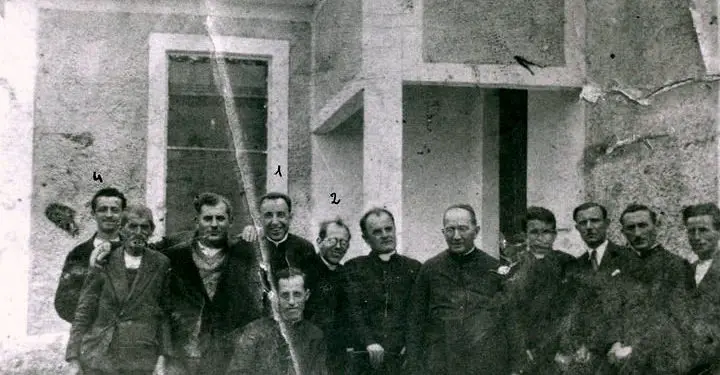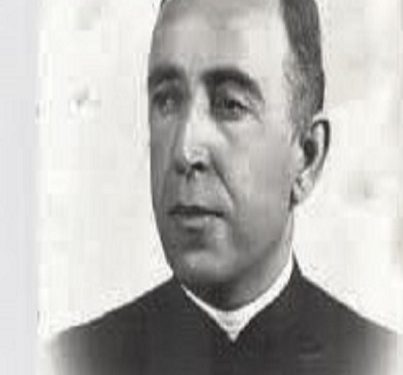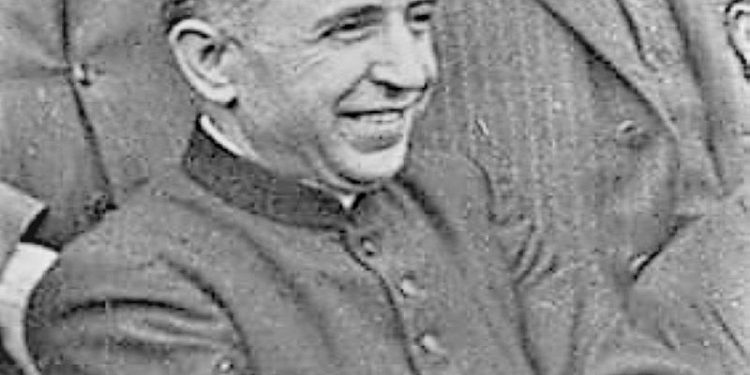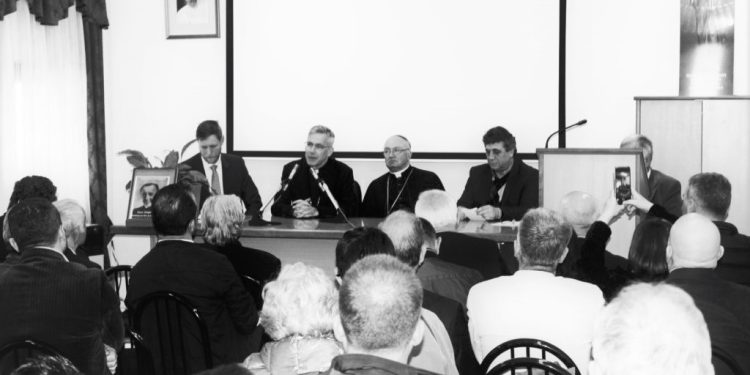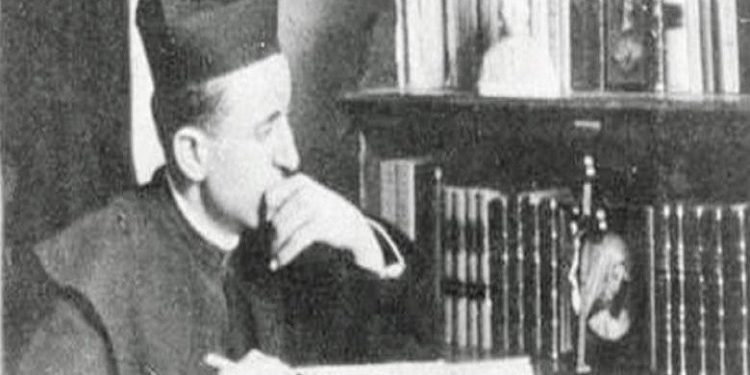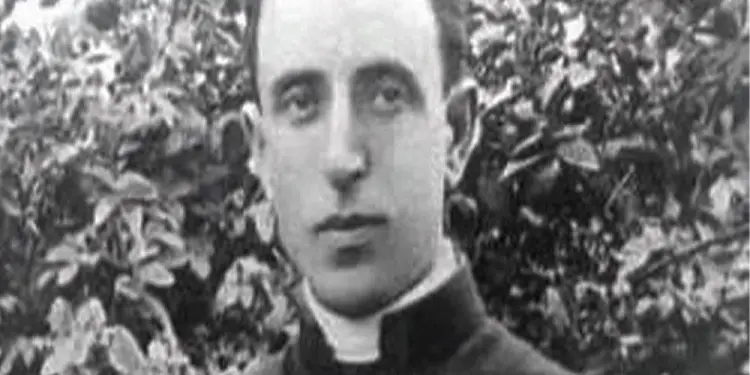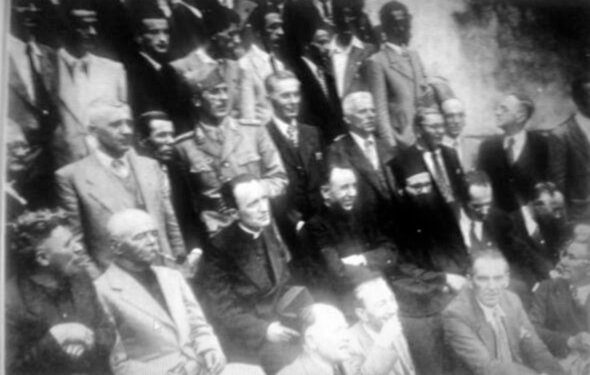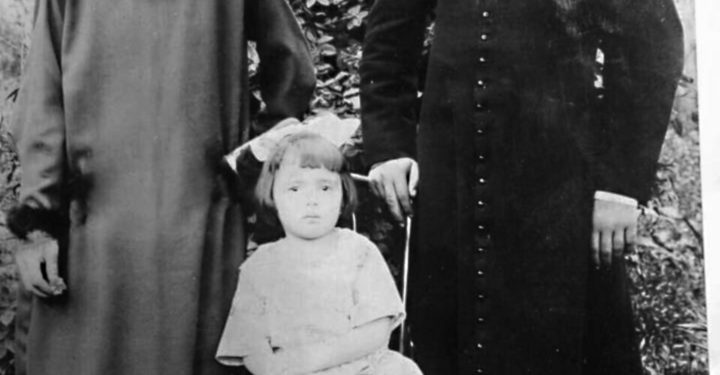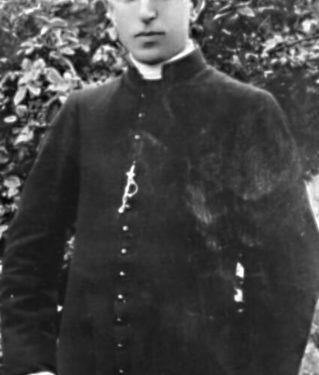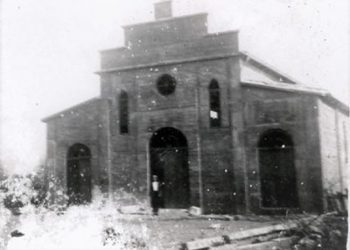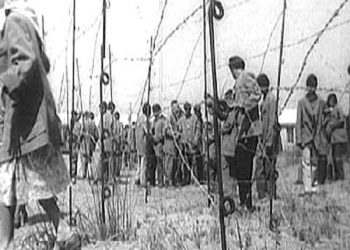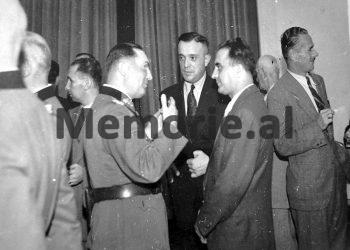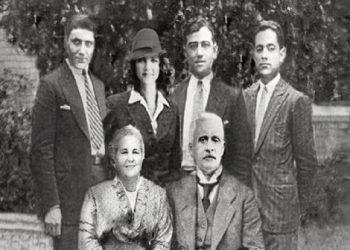NIKOLLE LOKA
Av. ALFRED DUKA
NIKOLIN KURTI
Part thirty-five
– THE FORECAST MURDER OF A CLERGYMAN OF THE RENAISSANCE –
Memorie.al / Before we begin to briefly analyze the investigative and judicial file in charge of the defendant Shtjefën Kurti and others, for the reader we will make a parenthesis of the right and its history in human society, with the goal of coming to our criminal and procedural law, from its beginnings and throughout the years of the dictatorship.
Continues from last issue
A review of the first trial, to understand the second trial
Judicial decision
THE PEOPLE’S REPUBLIC OF ALBANIA
KRUJA DISTRICT COURT
No. 54 of the decision
Dt. 30/7/197
No. 46 of the act
The defendant Shtjefën Kurti, although he has accepted the accusation against him, made by the defendant Mark (Bardhok) Marku, that in 1967, the defendant told him: “steal your sweat and stealing from me is not a crime”, expressed with reservations, saying that: I heard that the issue of thefts was being discussed, but I don’t remember saying these words at the time, but since they are saying this, I accept it”. The court considers that the defendant’s claim must be rejected because the opposite of his claims was proven, through the testimony of Luigj Vates, as well as all the subsequent actions that the defendant has carried out, until he manages to make a call to steal, to destroy the cooperative. It was exactly this line that the defendant Shtjefën followed, during the hostile activity to undermine the cooperative.
During the trial of the case, it was proved that the defendant Ndue Leti, since 1962 until the day of his arrest, from time to time himself, and in cooperation with other persons, has embezzled from the products, the owner of the agricultural cooperative.
The defendant Ndue, in collaboration with the defendant Pjetër Biba, stole 700 kg. Corn worth 1,680 ALL, in cooperation with the defendant Pjetër Biba and Mark (Bardhok) Marku, 300 kg. corn worth 720 ALL, in cooperation with the defendant Mark Bardhok Marku, 200 kg. corn worth 480 ALL, in cooperation with the defendant Fran Noci, 700 kg. with the value of 1,680 ALL, apart from these, he appropriated 310 kg. Corn, 90 kg. Wheat worth 1,014 ALL 116 ALL from mill irrigation, as well as 12 pieces of sacks worth 60 ALL. In this way, it was proven that the defendant Ndue Leti, alone or in cooperation in 14 cases, appropriated the assets of the cooperative in the amount of 5,750 ALL. In these circumstances, the defendant has committed the crime provided for by Article 80/1 of the Criminal Code. The defendant’s crime is proven by his statements, which are consistent with those of: Pjetër Biba, Mark Bardhok Marku and Fran Noci, and with the statements of the witnesses: Bajram Cafi, Gjoka Nika, Pashk Miri, Like Hyseni, in the process-vebal of control of the apartment, as well as the document dated 28/11/1960.
During the trial of the case, it was proven that the defendant Pjetër Biba and Ndue Leti, for some time and during the years 1968 and 1969, have been gambling, committing the crime provided by article 285/2 of the Criminal Code. The defendants’ crime is proven by their statements, as well as by the attributions made by the defendant Mark Bardhok Marku, as well as by the statements made by the investigator, the witness Dodë Miri.
During the trial of the case, it was proven that the defendants have developed criminal activity for a long time in a continuous and systematic way. This activity has been increasing, both in terms of volume and the number of people involved in crime. It was also proven that 5 of the 7 defendants, first degenerated morally, committing the crime of theft, 2 of them gamblers and then ended up in the parasite, they are unhappy people, and finally enemies of the popular power.
Being inspired by the feeling that, to steal at any cost in any case and with anyone who can degenerate on this side. The defendants implicated a wide range of people in the crime, the defendant Mark Bardhok Marku, acted with 8 groups, the defendant Pjeter e Ndue Leti, with 5 groups, the defendant Fran Ndoci, acted in 3 groups, the defendant Zef Nishi has acted with 2 groups, through which they have seriously damaged the conscience of many people and the socialist wealth. An activity with such a participation and the intention of the defendants Shtjefën Kurti and Mark Bardhok Marku, Pjetër Biba, Agustin Preçi, Fran Ndoci and Zef Nishi, that through their work they manage to reduce the income of the cooperative, increase dissatisfaction measures to such a degree that they rise up in revolt for the destruction of the agricultural cooperative and the displacement of the mentioned and hated capitalist order, emphasizes the dangerousness of their work.
The defendants, being in a hostile position against the people’s power, completely left our socialist reality and started to turn everything upside down. They forgot the miserable condition of the Gurzak peasants in the past, they forgot who used to graze in the lands of Gurëz before the liberation, they forgot what water the Gurzakët drank, what they drank from the Mat river, they forgot the fenced and
mud huts, they forgot that before in In Gurez, no one cared about the cultural elevation, nor for the diseases of the Gurez people. To them the embankment of Mati, the large systemizing and drainage canals of irrigation, 8-year-old primary schools in every neighborhood of Gurezi, medical centers, water extracted from the depths of the earth, electric lights, radios in almost every house, other facilities, social – cultural, economic buildings such as stables, carts, etc.
Instead of creating belief in superiority, on the contrary, they created hatred. While the people of Gurzak with their sweat and labor built such works that have flourished the village, on the contrary, such defendants as: Mark Bardhok Marku, Agustin Preçi and Fran Ndoci, made plans to set fire to them and poison the people, etc. . Even the water and lights that the popular government brought to Gurëz produced poison and blinded the eyes of these defendants. Instead of retreating in front of this reality, they went deeper and deeper and manage to dare to raise their hand against the popular power which is the product of the blood of 28 thousand martyrs and the biggest victory that our people has achieved in its history.
The defendants are from:
Shtjefën Kurti, a rich merchant, Fran Ndoci, an average peasant; while Mark Bardhok Marku, Agustin Preçi, Pjetër Biba and Ndue Leti, with poor origins benefited from the agrarian reform, these last two excluded from the party. With all the good composition of some of the defendants, they degenerated by betraying the interests of the class from which they came and turned into servants of the once and for all overthrown classes. They fell into this situation under the influence of the pressure of the foreign capitalist-revisionist ideology, which they left through listening to the commentary of foreign radio stations, as well as through the great influence of the religious fanaticism that was perpetuated and skillfully developed by the defendant Shtjefënn Kurti , Catholic clergyman, with a great hostile predisposition. The defendant Shtjefën, being a trusted enemy of popular power and loyal to the lower classes and the Vatican, became the spiritual inspirer, instigator and main organizer of this activity.
He did not learn from the lesson of his ancestors, he did not learn from his own lesson either. In 1947, the defendant Shtjefën raised his hand against the government, therefore the Military Court of Tirana, with decision No. 162 dated 17/4/1947, sentenced him for crimes against the state in cooperation with the traitorous group of Sami Qelibashi, to 20 years deprivation of liberty, hoping that in the end this defendant would also reflect on the truth. On the contrary, the defendant Shtjefën, as soon as he was released from the prison door, set foot on the land of Gurëz, did not delay in vomiting bile against the power of the people and started inciting and organizing such a counter-revolutionary act, such as the uprising of the people against the cooperative of own. Acting in this way, he showed once again his consequence in hostile activity. Although he pleaded guilty in court, he has lost the slightest hope of rehabilitation.
The defendant Mark (Bardhok) Marku, has developed agitation and propaganda in a wide circle personally with all the defendants, for a long period since 1964, has systematically stolen large amounts for a long time and with a circle wide range of people, he saved the economy through thefts and damages, he was implicated in 8 groups of embezzlers and has the largest number of episodes, the longest period and the widest circle of people with whom he acted. He, on the other hand, comes from a family with poor peasant origins, which benefited from the agrarian reform, is self-taught, middle-aged, and in court he maintained a remorseful attitude and contributed to the discovery and unraveling of his activity and that of the other defendants. . However, the dangerousness of the defendant and his act is great considering the breadth, scope and continuity of this activity.
The defendant Agustin Preçi, the propagandist activity against the popular government, has developed it for a long period since 1964, while the sabotaging activity, he has carried out by means of damages during the performance of various works in the cooperative. Former teacher, of average cultural level, with a young age, but with a special role in the group. He comes from a poor peasant background, benefited from the Agrarian Reform, has admitted his guilt before the court and is remorseful, is sick, has an uncle convicted of crimes against the state.
The defendant Fran Ndoci has been conducting agitation and hostile propaganda against the popular government since 1964. He has repeatedly embezzled socialist property. He also committed the act of sabotage by damaging property during the execution of the works. He comes from a family of middle origin, has 7 years of education and is young. In the court, he did not accept because it belongs to sabotage
The defendant, Pjetër Biba, has started agitation and propaganda since 1964. He has carried out the sabotaging activity by systematically embezzling large sums in cooperation. He comes from a poor stratum, benefited from the Agrarian Reform, is a lazy element and a gambler, with self-taught education and without any cultural development, of mature age, excluded from the party. In front of the court, he showed remorse and pleaded guilty.
The defendant, Zef Nishi, started the hostile activity in 1969, the agitation and propaganda as well as the act of sabotage. During 1969, he appropriated socialist wealth in large amounts, in a group and in a systematic way. He comes from a family of middle peasant origin, with 7 years of education, of average age. He pleaded guilty in court and is remorseful.
The repentant Ndue Leti, has developed agitation and propaganda since 1964 and has appropriated socialist wealth in large sums in cooperation. He did not accept the charge of propaganda agitation. He has unfinished primary education, mature age, excluded from the party.
The court, in addition to these, in determining the amount of punishment, has taken into account other circumstances that have influenced the development of this activity, such as the waste of the past that has been nurtured by the revisionist capitalist environment and instigated by the sworn enemy element. , such as the sense of parasitic property, the desire to live on the sweat of another. In the development of this activity, the lack of vigilance, putting people in places with material responsibility where material values are stored without checking them in a systematic way, as well as serious violations in the implementation of certain rules for the administration of material values, has influenced.
Taking into account all this, the court based on articles 278, 279 of the Criminal Code.
DECIDE
1-Declare the defendant Shtjefën Kurti guilty of the crime of sabotage and on the basis of Article 72-12 and 42 letter “a” of the Criminal Code, sentence him to death by firing squad, and confiscation of property.
-Declare the defendant Shtjefën Kurti guilty of the crime of agitation and propaganda and on the basis of Article 73/1 of the Criminal Code. Sentences him to 10 years of imprisonment.
– On the basis of Article 27, 28 of the Criminal Code. Punishes him with removal of electoral rights for 5 years.
Finally, based on Article 48 of the Criminal Code. sentences him to death by firing squad, with confiscation of property and, based on articles 27, 28 of the Criminal Code, with the removal of electoral rights for 5 years.
2- Defendant Mark (Bardhok) Marku is declared guilty for the crime of sabotage and based on Article 72/12 of the Criminal Code, he is sentenced to 15 years of imprisonment and confiscation of property.
-Declare the defendant Mark (Bardhok) Marku guilty of the crime of agitation and propaganda and, based on Article 72/1 of the Criminal Code, sentence him to 6 years of imprisonment.
– On the basis of Article 27, 28 of the Criminal Code, he is sentenced to deprivation of electoral rights for 3 years.
Finally, on the basis of Article 48 of the Criminal Code, he is sentenced to 18 (eighteen) years of imprisonment, with the confiscation of property and the removal of electoral rights for 3 years.
3-Declare the defendant Agustin Preçi guilty of the crime of sabotage and, based on article 72/12 of the Criminal Code, sentence him to 12 years of imprisonment and confiscation of property.
-Declare the defendant Agustin Preçi guilty for the crime of agitation and propaganda and, based on Article 73/1 of the Criminal Code, sentence him to 8 years of imprisonment.
– On the basis of Article 27, 28 of the Criminal Code, he is sentenced to the removal of electoral rights for 3 years.
Finally, on the basis of Article 48 of the Criminal Code, he is sentenced to 13 years of imprisonment, with the confiscation of property and the removal of electoral rights for 3 years.
4-Declare the defendant Pjetër Biba guilty of the crime of sabotage and, based on article 72/12 of the Criminal Code, sentence him to 12 years of imprisonment, confiscation of property.
-Declaring the defendant Pjetër Biba guilty for the crime of propaganda agitation and based on Article 73 of the Criminal Code, sentences him to 5 years of imprisonment.
-Declares the defendant Pjetër Biba guilty for the crime of gambling and, based on Article 285/2 of the Criminal Code, sentences him to 6 months of imprisonment.
– On the basis of Article 27, 28 of the Criminal Code, he is sentenced to the deprivation of electoral rights for 3 years.
Finally, on the basis of Article 48 of the Criminal Code, he is sentenced to 14 years of imprisonment, with the confiscation of property and the removal of electoral rights for 3 years.
5-Declare the defendant Zef Nishi guilty for the crime of sabotage and, based on Article 72/12 of the Criminal Code, sentence him to 12 years of imprisonment and confiscation of property.
– Declare the defendant Zef Nishi guilty for the crime of agitation and propaganda and, based on Article 73/1 of the Criminal Code, sentence him to 4 years of imprisonment.
– On the basis of Article 27, 28 of the Criminal Code, he is sentenced to the removal of electoral rights for 3 years.
Finally, on the basis of Article 48 of the Criminal Code, the defendant Zef Nishi is sentenced to 12 years of imprisonment, confiscation of property and removal of electoral rights for 3 years.
Court or terrorist gang?!
Criminal trials in our country, throughout the time of the Dictatorship, reflected the characteristics of the form of government and state of the Dictatorship of the Proletariat. The court is the passport of a state, it cannot have a better face than its Justice. Since the early organizations, the efforts of the powerful personalities of the time, to take care of their Justice, have not been lacking. Given that state tradition has been missing in our country, throughout history it has been replaced by Customary Law, or as it is called the Canon, its antiquity is still an unsettled debate today, but which everyone agrees is very centuries old , well before the time of the personality that bears his name.
The ancient Albanian customary law, although unwritten, was applied with an amazing rigor, without a coercive force, but in a self-operating manner. This is how it has worked for centuries and, paradoxically, it was collected and published in the first years of the formation of the Albanian state, by the Reverend Father Shtjefën Gjeçovi, the friend of the person sentenced to death by firing squad from the above court decision. (or rather the Kruja Gang).
The death penalty in the Canon of Leka, but also of Skënderbeu, or of Labëria, was an extremely rare sanction, except for very serious crimes. Leka, Skënderbeu and the drafters of the Labëria of their Canon would turn in their graves, if we were to bring forward the decision of this court of the Albanian state, given many centuries after them, paradoxically right there, in that village where our Titans had destroyed The largest and most powerful army of the time is the Battle of the Red Field, or Albulena. They would be pissed off! They would rise from the grave and pour their spoons on us, when they found out that an Albanian state court has sentenced a 73-year-old Rilindas priest to death by firing squad, just for his different opinions from the government and Pariah of the country!
Ah, I forgot, even that some poor people did not properly destroy some corn plants, a crime for which they were sentenced to 72 years of terrible imprisonment! Then they would deny us, when they found out that none of those terrorists, who were called judges, took responsibility for that way. They didn’t even apologize, except for one of them! Then I don’t know what they would have done when they heard that that decision was upheld by the Supreme Court of their country! Not only that, but that they have reached the now democratic heights of Justice!
Human rights were not recognized even for the citizens who were supposed to be free, not to mention the citizens who were taken as defendants, who were treated like animals in the detention rooms, but also after their punishment. Violence against the defendants, but even then, regardless of the fact that it was not legally allowed, was systematically practiced by investigators and prosecutors. The investigation and the trial came in violation of all the principles of an investigation, or a normal trial, these principles established as a standard of judgment in early civilizations such as Hellenic, Roman, French, Italian Penal Codes, etc., of course excluding the Middle Ages, as a dark period of human society. Violation of the principle of the Presumption of Innocence, until a final verdict, is not a modern invention, but an ancient principle, rigorously applied in all the aforementioned civilizations.
This important principle was not even mentioned in the criminal procedural laws of the time of the dictatorship and was therefore considered a foreign principle, which had no place in our law. Also, the right to defense is an established principle that, with the birth of the right and its removal by “law”, transforms the judgment in our country like a bird that plucks one of its wings and tells it to fly now, because that’s what I want ! To speak no further of equality of arms in a process, &c., &c.
Of course, the Court of the Krujë district, during the process of this judicial review, which could not even have a name like that, since it, was no better than an inquisition process of the Middle Ages, would have produced that shameful, criminal Decision, with fabricated accusations and mounted outside of any legal logic.
In order to give a fair decision based on the law and judicially proven facts, the court must first establish the fact that in order to have a concrete picture of the criminal offense, the existence of all its constituent elements taken together is necessary, who are: a) the object of the criminal offense; b) objective side; c) the subject and ç) the subjective side. The provability of the objective and subjective elements of the picture of the criminal offense serves as a basis for putting a person before the criminal responsibility. Also, the criminal offense represents in itself a unity of all the elements of its picture. It is considered complete when all four of its elements exist: the object, the objective side, the subject and the subjective side.
If one of these elements is missing, the criminal offense does not exist. Therefore, in the concrete case, the court had to verify the existence of all the elements of the criminal offense and its image in particular, in an identified manner for each defendant. The figure of the criminal offense reflects the legal form of the criminal offense, while in terms of the specific case, we can say that we are absolutely not in front of any element of the criminal offense of Sabotage, as well as theft in large proportions, but only of the simple one that, as we said above, its predictive provision, provided for a sentence of a maximum of five years of imprisonment.
For the legal qualification of the offense it is important, in addition to the identification of the elements mentioned above, it is mandatory to prove the consequence resulting from the illegal actions of the defendants, as an element of the objective side of the criminal offense, beyond any reasonable doubt, as standard of proof.
Before disposing of the criminal sentence, the court must take into account the general principles and criteria of sentencing. The court emphasizes that criminal legislation has the duty to protect important values such as human dignity, his minimum rights and freedoms, etc. As far as the purpose (ratio) of the criminal punishment is concerned, of course it must fulfill two different functions, connected in a unity with each other, which can be considered as educational, point first for the convicted person on the one hand on the other hand, there is the function of general prevention of criminal offenses, since the threat that the state will apply criminal sanctions whenever citizens commit acts punishable by criminal legislation, works as a way to discourage and prevent any of the citizens to take actions that contradict the criminal norms.
On the other hand, there is the function of special prevention, which is directly related to the author of the crime, since applying the criminal sanction aims to re-educate him so that, after serving the sentence, he will not undertake criminal actions in the future. Seen from this point of view, the capital punishment goes beyond these functions, but even the heavy and proportional punishments, as in this particular case, come against this methodology of giving the decision and its educational character. Such decisions, as of the Court of Kruja, do nothing but inspire terror, as in the time of the Inquisition. The criminal sanction of any nature should aim only at the re-education and then the integration of the convicted person into social life.
In this way, in order to have a successful re-educational process, the criminal punishment must be perceived by the perpetrator as fair and in proportion to the crime committed. The fair character of a punishment is related to its compatibility with the degree of social dangerousness of the criminal offense and its author, but on the other hand also respecting human dignity, a balance between the importance of the punitive measure and the importance of the criminal offense, provided by law.
It is very important that the court should assess that the criminal punishment is the result of the assessment of the social dangerousness of the criminal offense on the one hand and the degree of guilt of its author on the other hand, but this obligation is not even taken into consideration during the trial the defendants, from the Court of Kruja. Of course, in this case it should be emphasized that the definition of criminal offenses and types of punishments are at the discretion of the legislator, as he has assessed them, without taking into account that the sanctions, especially for criminal offenses against the state, are draconian, on the other hand their individualization , case by case, is at the discretion and at the same time the obligation of the court, which, examining all the legal elements of the criminal offense, the degree of guilt and the consequences resulting from the criminal offense, determines the type and measure of punishment for the perpetrators of the criminal offenses, but by implementing the orders of the government, as in our case, the court turns into a terrorist gang that gives punishments according to the orders! Memorie.al
The next issue follows




